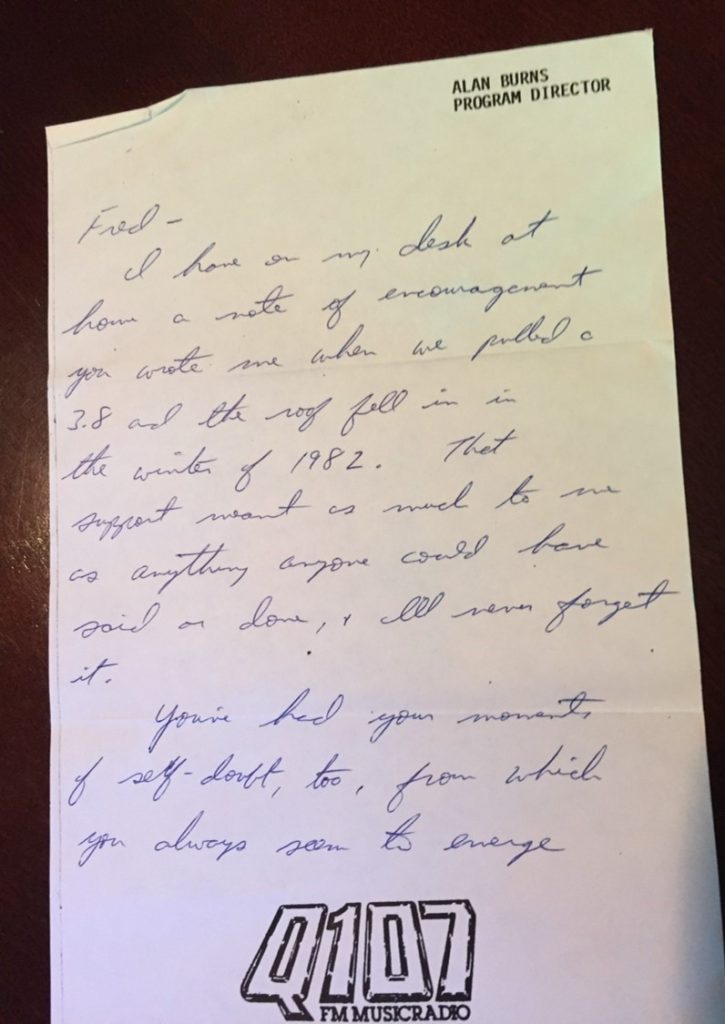
Welcome to another #TBT and a trip eight years back in time to 2016. To me, that doesn’t seem all that long ago, but in “radio years,” it’s been eons.
A lot has changed in radio – and in life – for most of us during this time, but one thing is a constant: the joys and heartbreaks of being the program director of a radio station.
If you’ve never had the honor to hold this job, you could interview 100 PDs to try to learn what it’s like. But until you sit in “the chair” on ratings day, you cannot possibly imagine the way it feels to program a radio station, whether it’s Z100 or a country station in Kentucky.
Today’s post takes you there. It’s a look at the often lonely position of programming a radio station, and seemingly having the weight of the world on your shoulders. It used to be a man’s world, but increasingly, women are moving into the job, bringing a different look to programming at a 24/7 operation called a radio station.
Other industries have come up with cool, modern names for the job. In Hollywood, they’re known as “showrunners.” In Silicon Valley and the world of business, they’re called Chief Content Officers.
Be kind to yours. He or she is doing their best to keep those ratings up, the brand strong, and the operation intact.
And just to be on the safe side, you might want to give him or her a little distance. Especially on ratings day. – FJ
It started out as a Facebook post from Lori Lewis, a true “letting your hair down moment” about the vulnerabilities of being a PD. And from there, All Access columnist Perry Michael Simon picked up the ball and wrote a great column about the trials and tribulations of programming a radio station. It was aptly titled, “Darkness Before The Dawn.” Everyone who has ever sat behind the PD desk – from Kevin Weatherly to Scott Shannon to Rick Cummings – could relate to Lori and Perry’s thoughts.
So I hope neither of them will think I’m piling on with today’s blog post, but it hit home for me because I actually spent time over the Memorial Day Weekend cleaning out old files and boxes from the “good old radio days.”
And I came across this note from Alan Burns. We were each programming ABC-Owned radio stations back then; him at Q107 in D.C., and me here at WRIF in Detroit. I was experiencing one of those ratings valleys, and began to question everything.
 Alan’s missive served as that morale booster that I sorely needed at that painful moment in time. As you can see when you read this partial note, I had sent him a similar note the year before when he was not feeling great about his situation. Yes, every PD needs to know they’re OK, that their ratings aren’t a reflection of who they are as people, and that better days are ahead. The fact I’ve saved this note from more than 30 years ago tells you how meaningful it was to receive it at that low point.
Alan’s missive served as that morale booster that I sorely needed at that painful moment in time. As you can see when you read this partial note, I had sent him a similar note the year before when he was not feeling great about his situation. Yes, every PD needs to know they’re OK, that their ratings aren’t a reflection of who they are as people, and that better days are ahead. The fact I’ve saved this note from more than 30 years ago tells you how meaningful it was to receive it at that low point.
Like many of you, I wore my ratings around like Hester Prynne in A Scarlet Letter. I read that book by Nathaniel Hawthorne in the 8th grade, and while it is a story about owning your mistakes, it is also a tale about personal growth, and the understanding of others. In this case, a fellow program director who knew just what I needed during a very dark time.
So I thought I’d take a moment over the long weekend to write a note to all of you who are piloting your own starships, trying to navigate the roiling waters of change, and coping with the ramifications of your next ratings book.
Here’s a letter to anyone and everyone who is programming a radio station, who might just be looking for a word or two of encouragement, or just a little empathy. You can tack it up above your desk, put it in your top drawer, and at least know there’s encouragement from people like me, Perry, and Lori. Not all programmers are lucky or fortunate enough to get that PD pat on the back that is so needed in tough times, so here’s yours:
Dear Program Director,
Being the brand manager of a radio station has never been an easy task, but it’s become so much more challenging in recent years. Disruption, diminishing resources, and the financial pressures are very real factors. If you’ve never programmed a radio station, you just don’t know what it’s like.
And the ratings…well, they’re the ratings. They have never been an exact reflection of how you’re doing, complicated now by digital delivery and the inability for any methodology to keep up with consumers.
So, here’s some advice from someone who’s not only been there before, but has worked aside hundreds of PDs over the past 30-something years.
- You are not your ratings. So don’t get too high when they’re great, or too low when they’re not. You’re better than this, and be assured that it all moves in cycles.
- It takes time to get good at this. Malcolm Gladwell suggests that mastering any skill requires 10,000 hours of work. By my calculations, that’s four years of programming.
- The best support group is other PDs. Like the notes that Alan Burns and I sent to one another, an empathetic programmer who is or has been in your boat is often just what you need.
- Reach out for help. No one is good at everything. If you’re a star at creating events, but not so great at music scheduling, hire to your weaknesses or ask for aid from the outside.
- Your staff is counting on you. Whether it’s one other person or a team of 20, they look up to you for guidance, direction, and confidence. Chances are, most of them are more insecure than you are.
- If you’re in a no-win situation, reassess. Even the greats aren’t going to program their way out of a Mission Impossible mess. If the conditions are such that there’s no way you can win, there is no shame in moving to a Plan B.
- Be honest to your boss, your company, and yourself. That old Shakespearian quote, “To thine own self, be true,” applies to every programmer, whether in New York City or Nome.
- You can do this. Someone with money and/or brains decided you’re the one to lead this station. They trusted you to make it happen. Storm troopers will not come to your front door, accuse you of not being worthy, and cart you off. Get back on the horse and do what you do well.
Sincerely,
Fred
Originally published by Jacobs Media








